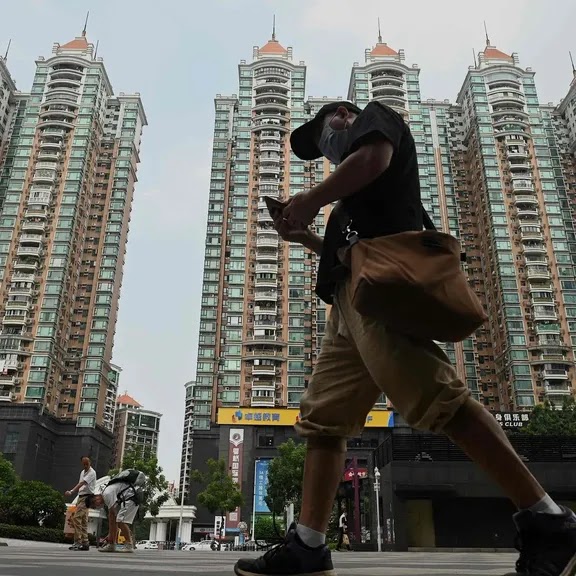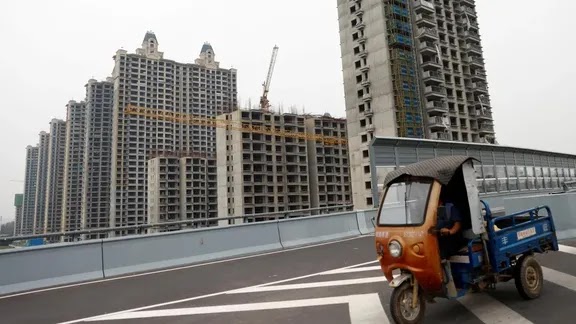Why Is China Willing To Pay The Price To Squeeze The Real Estate Industry

Observers say that Beijing is willing to pay the price to crack down on the real estate industry. Because a successful debt forgiveness campaign can create the foundation for a healthier and more stable economy.
According to Bloomberg, the Beijing government’s crackdown on the country’s huge real estate sector has weakened the industry. “The sky-high prices of houses and the huge debts of Chinese real estate groups will be gone,” said Eswar Prasad at Cornell University.
“Instead it is a much tougher market. The Beijing authorities will prevent speculative activities,” he added.
“China needs to curb speculation in the real estate sector by introducing financial constraints. Along with that are regulations for real estate developers who use high financial leverage, or families who are buying real estate as an investment vehicle,” said Mr. Logan Wright – Director of Market Research. China at Rhodium Group – comment.
“This could cause a shakeup in the real estate sector, which in turn impacts economic growth and financial stability,” commented Mr. Wright.
Ready to pay
However, according to Mr. Wright, Beijing is ready to pay the price to crack down on the real estate industry, in order to limit future financial market volatility and imbalance in the real estate market.
According to Mr. Bruce Pang – Head of Macro and Strategy Research at China Renaissance Securities Hong Kong Ltd. – China’s housing construction rate has outstripped basic needs over the past five years. To address the imbalance, construction activity needs to slow down for many years.
“It cannot change the fact that the main driver of the economy of the past 20 years will now become a drag on growth, at least for the next few years,” warned Mr. Pang. The real estate industry contributes 25{9fa2ae831048424756faedea87f44870cd2ea6d09bcfab62eb5dabc6b233e172} of China’s GDP.
“Prepaid home sales will be significantly lower going forward. The reason is the tightening policies of the Beijing government. Along with that, many homebuyers have lost faith and want to buy finished houses, “said the expert.
In December 2021, new home prices in 70 Chinese cities fell 0.28{9fa2ae831048424756faedea87f44870cd2ea6d09bcfab62eb5dabc6b233e172} compared with November. In November, house prices also fell 0.33{9fa2ae831048424756faedea87f44870cd2ea6d09bcfab62eb5dabc6b233e172}, according to data from the National Bureau of Statistics.
In the first-tier cities, resale prices rose about 0.1{9fa2ae831048424756faedea87f44870cd2ea6d09bcfab62eb5dabc6b233e172} in December. In November, house prices saw a 0.2{9fa2ae831048424756faedea87f44870cd2ea6d09bcfab62eb5dabc6b233e172} drop.
Recently, Beijing authorities have relaxed some restrictions on funding for the real estate sector. But this is not enough to boost the market.
Debt forgiveness campaign
Demand for home loans is still weak. Mid- and long-term loans by households saw the lowest increase since February 2020. The year-end discount programs of real estate developers put more pressure on house prices.
The real estate crisis in China – which started with billionaire Hua’s China Evergrande – has severely weakened the confidence of these state-owned buyers.
China Evergrande – China’s second largest real estate group – had to stop a series of housing projects because it could not pay contractors, suppliers and employees.
China Evergrande’s homebuyers have gathered at the company’s headquarters to claim their pre-paid home payments.
For indebted real estate giants, the Beijing government is likely to be involved in the restructuring process to prevent a recession, said Iris Pang, chief economist at ING Wholesale Banking. housing market, maintaining social and financial stability.
“State-funded investment platforms and state-owned real estate companies can participate in the restructuring process,” he added.
“A successful debt forgiveness campaign, with greater transparency, can create the foundation for a healthy and stable economy,” the expert said.
A financial crisis is highly unlikely, said Craig Botham, chief China economist at Pantheon Macroeconomics. “China still has many tools to manage these risks,” he explained.
“Banks play a major role, directly or indirectly, in financing the real estate sector. The Beijing government still has very good control over the banking system. So the possibility of chaos in China’s financial markets is quite small,” he concluded.





